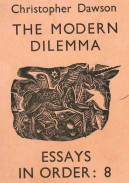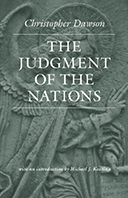 The Modern Dilemma (1932) was published as Issue No. 8 of a series of booklets entitled Essays in Order. This venture was founded by a group of writers and artists who were part of the Catholic intellectual revival of the 1930s. Each issue, published in hardback by Sheed & Ward, carried on its cover a woodcut of a unicorn by the artist and poet David Jones. Dawson made two contributions to the series, the other one being Christianity and the New Age. Other contributors included Jacques Maritain (Religion and Culture), Nicholas Berdyaev (The Russian Revolution) and Herbert Read (Form in Modern Poetry).
The Modern Dilemma (1932) was published as Issue No. 8 of a series of booklets entitled Essays in Order. This venture was founded by a group of writers and artists who were part of the Catholic intellectual revival of the 1930s. Each issue, published in hardback by Sheed & Ward, carried on its cover a woodcut of a unicorn by the artist and poet David Jones. Dawson made two contributions to the series, the other one being Christianity and the New Age. Other contributors included Jacques Maritain (Religion and Culture), Nicholas Berdyaev (The Russian Revolution) and Herbert Read (Form in Modern Poetry).
Central Themes
The book is subtitled “The Problem of European Unity” and deals with a theme close to Dawson’s heart. Throughout his life, Dawson was a firm supporter of European Unity and in the first chapter of this book he sets out his opposition to exclusive nationalism and his sympathy with the idea of a united Europe. However, Dawson argued that “the true foundation of European unity is to be found not in political or economic agreements, but in the restoration of the spiritual tradition on which that unity was originally based.”
Drawing on his knowledge of ancient and medieval history, he draws parallels with ancient Rome in the 1st century BC, when that civilisation had conquered the world but lost its soul – a situation which was changed by Augustus and his vision of restoring the religious and social foundations of the culture, resulting in “the profoundly spiritual and catholic genius of Virgil”. In a similar way, “our civilisation stands in no less need of moral and social reconstruction.”
For Dawson, the idea of a united Europe has implications beyond its borders, because “the crisis of Europe is the crisis of the world”. “All the living forces that are moving the world today, whether scientific, economic or political, have their roots in European culture and would wither if that culture were to break down.” Hence, he believed that the survival of Europe and of civilisation in general depended on four ideals: the Christian ideal, the ideal of humanity, the scientific ideal and the ideal of democracy.
Evaluation of the work
The issues discussed in this work are still very much with us in the 21st century, particularly the problem of European unity. Dawson’s chapters on The Forces of Change, Democracy, Science and Religion continue to stimulate thought on some of the key questions of the modern world.
REVIEW OF THE ORIGINAL EDITION:
“In this little book (one of Messrs. Sheed & Ward’s admirable Essays in Order), Mr. Dawson has raised the question: How are we to adjust ourselves to this vast movement of change?” – E.P. Richardson, The American Review, May 1933


